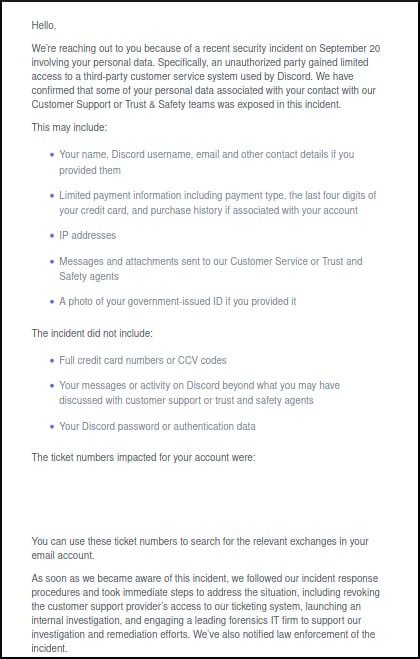Hackers stole sensitive Discord user data, including real names, email addresses, and partial payment details, after compromising a third-party customer service provider. The attackers demanded a ransom, highlighting critical supply chain vulnerabilities that could aid in solving crypto-related crimes.
Discord User Data Compromised in Third-Party Customer Service Breach

In a stark reminder of the fragility of digital ecosystems, Discord has confirmed a significant data breach stemming from a compromised third-party customer service provider. The attack, which occurred on September 20, 2025, exposed personally identifiable information (PII) for users who interacted with Discord’s support teams, including real names, email addresses, and even government-issued IDs for a small subset. Hackers accessed the data through the provider’s systems, demanding a ransom from Discord and threatening to leak the information—a move that cybersecurity experts warn could unravel identities and aid in tracking down crypto scammers.
The Anatomy of the Attack
The breach targeted a third-party vendor handling Discord’s customer support and Trust and Safety operations, though Discord has not disclosed the provider’s name or the exact access vector. According to Discord’s notification to affected users, the unauthorized party obtained limited access to ticketing systems, exposing:
- Personal Identifiers: Full names, usernames, email addresses, and contact details.
- Support Interactions: IP addresses, messages, and attachments shared with agents.
- Financial Data: Partial billing information like payment types, last four credit card digits, and purchase histories.
- Government IDs: Photos of driver’s licenses or passports for a limited number of users.
Discord acted swiftly, isolating the provider from its systems and launching an investigation with a forensics firm and law enforcement. In a statement, the company emphasized:
"This included revoking the customer support provider’s access to our ticketing system, launching an internal investigation, engaging a leading computer forensics firm to support our investigation and remediation efforts, and engaging law enforcement."
 Discord's data breach notification to affected users (Source: VX-Underground)
Discord's data breach notification to affected users (Source: VX-Underground)
Why This Breach Matters: Identity Theft and Crypto Implications
The stolen data represents a goldmine for malicious actors. As noted by the security group VX-Underground, the information constitutes “literally peoples [sic] entire identity,” enabling everything from phishing campaigns to sophisticated identity fraud. More alarmingly, Alon Gal, CTO of threat intelligence firm Hudson Rock, highlighted how the breach could inadvertently assist in combating cybercrime:
“If it leaks, this db is going to be huge for solving crypto-related hacks and scams because scammers don’t often remember using a burner email and VPN and almost all of them are on Discord.”
This underscores a paradoxical twist: while the breach endangers users, it could expose patterns linking pseudonymous online personas to real-world identities, particularly in decentralized finance scams. For Discord’s 200 million monthly users—many of whom are gamers or crypto enthusiasts—the incident amplifies risks of targeted social engineering and financial exploitation.
Broader Supply Chain Vulnerabilities
The attack echoes recent campaigns by groups like ShinyHunters, which compromised Salesforce instances using stolen OAuth tokens to access data from hundreds of companies. Last month, ShinyHunters claimed theft of 1.5 billion records, suggesting Discord’s breach may be part of a wider trend of targeting third-party integrations. This incident serves as a critical lesson for developers and security teams: outsourcing customer support or other functions introduces cascading risks. Organizations must enforce stringent access controls, conduct regular third-party audits, and adopt zero-trust architectures to mitigate such supply chain threats.
As the investigation continues, with Discord yet to confirm the number of affected users, the breach reinforces that in an interconnected digital world, security is only as strong as the weakest link in the chain. For now, users should monitor accounts for suspicious activity and consider multi-factor authentication—not just as a precaution, but as a necessity in an era where even trusted platforms can become collateral damage in third-party failures.
Source: BleepingComputer

Comments
Please log in or register to join the discussion